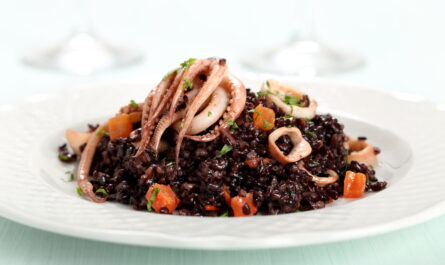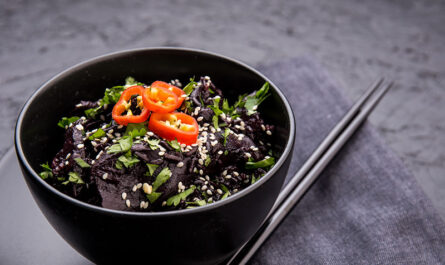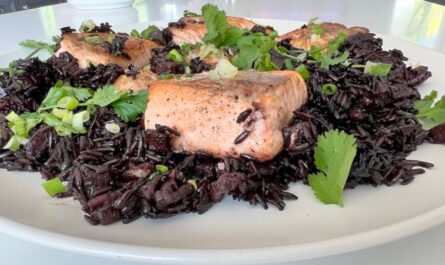In recent years, the ancient grain known as black rice has gained popularity not just for its unique taste and striking appearance, but also for its potential health benefits. One area of growing interest is the connection between black rice and fertility. As more people become aware of the importance of diet in reproductive health, black rice is being explored as a potential dietary addition that may support fertility. This article delves into the nutritional profile of black rice and its possible impact on fertility, offering insights for those seeking natural ways to enhance their reproductive health.
The journey towards understanding the potential benefits of black rice in fertility begins with its nutrient-rich composition. Known as a superfood, black rice is packed with antioxidants, vitamins, and minerals that play crucial roles in overall health. By incorporating black rice into your diet, you might be taking a step towards improving fertility naturally. Let’s explore the components of black rice that make it a promising candidate for supporting reproductive health.

The Nutritional Profile of Black Rice
Black rice, often referred to as ‘forbidden rice’ due to its historical exclusivity to Chinese royalty, is a powerhouse of nutrients. It is rich in iron, vitamin E, and antioxidants such as anthocyanins, which give the rice its distinctive dark hue. These compounds are essential for maintaining good health and may contribute positively to fertility.
Antioxidants and Fertility
Antioxidants are vital in protecting the body’s cells from damage caused by free radicals. The high levels of antioxidants found in black rice can help reduce oxidative stress, which is linked to fertility issues in both men and women. By reducing oxidative stress, black rice may improve the quality of sperm and eggs, thereby enhancing fertility.
Iron and Reproductive Health
Iron is crucial for producing hemoglobin, a protein in red blood cells that carries oxygen throughout the body. Adequate iron levels are necessary for a healthy menstrual cycle and to prevent anemia, which can affect fertility. Black rice is a good source of iron, making it a beneficial addition to the diet of individuals looking to support their reproductive health.
The Role of Black Rice in a Balanced Diet
Incorporating black rice into a balanced diet is a simple way to boost nutritional intake. It is gluten-free and can be used as a substitute for white or brown rice in various dishes. Moreover, its nutty flavor and chewy texture make it a delightful addition to meals.
Creating Fertility-Boosting Meals
For those looking to include black rice in their diet, there are numerous recipes to explore. From salads to sushi, the versatility of black rice allows it to be used in a variety of culinary creations. You can check out these black rice recipes to get started.
Scientific Perspectives on Black Rice and Fertility
While anecdotal evidence supports the benefits of black rice for fertility, scientific research is ongoing. Studies suggest that the antioxidants and nutrients in black rice may positively affect reproductive health, but more research is needed to establish a direct link. For those interested in the scientific exploration of black rice, this study provides a detailed overview.
The Importance of a Holistic Approach
While adding black rice to your diet can be beneficial, it is essential to approach fertility with a comprehensive mindset. A balanced diet, regular exercise, and stress management are all key components of maintaining reproductive health. Therefore, while black rice can play a part, it should be one aspect of a broader lifestyle focus.
Integrating Black Rice Into Your Lifestyle
To make the most of black rice‘s fertility benefits, consider integrating it into your daily meals. Whether you’re preparing a simple black rice soup or a more elaborate dish, the key is consistency. Over time, the nutritional benefits of black rice can contribute to overall well-being and reproductive health.
Practical Tips for Cooking with Black Rice
Cooking black rice is straightforward, but it requires a bit more water and cooking time compared to white rice. To retain its nutrients, avoid overcooking. Additionally, pairing black rice with vegetables and lean proteins can create balanced meals that support fertility.
Conclusion: Embracing the Black Rice Journey
In conclusion, while the direct link between black rice and fertility requires further scientific validation, its nutritional benefits make it a worthy addition to any diet focused on reproductive health. By embracing black rice as part of a holistic approach to fertility, individuals can enjoy its rich flavors while potentially enhancing their overall well-being.
Where to Find More Information
For more insights into the benefits of black rice, consider exploring this detailed article that discusses its various health advantages.

FAQs About Black Rice and Fertility
Is black rice safe to consume during pregnancy?
Yes, black rice is safe to consume during pregnancy as it is rich in nutrients that support both maternal and fetal health. However, it is always best to consult with a healthcare provider before making significant dietary changes.
Can black rice improve male fertility?
While research is ongoing, the antioxidants in black rice may help improve sperm quality by reducing oxidative stress, potentially enhancing male fertility.
How often should I eat black rice for fertility benefits?
Incorporating black rice into meals several times a week can help ensure you receive its nutritional benefits. Consistency is key, so consider adding it to a variety of dishes to enjoy its full potential.
This article contains affiliate links. We may earn a commission at no extra cost to you.




